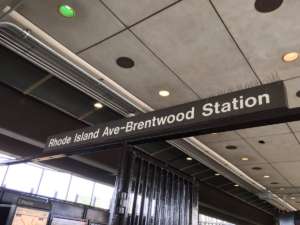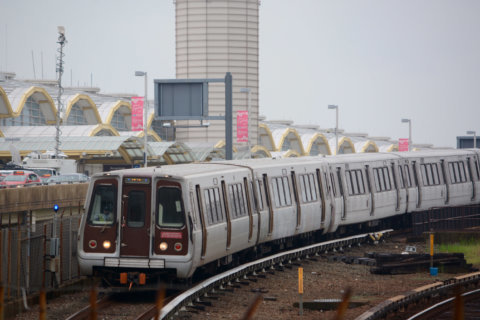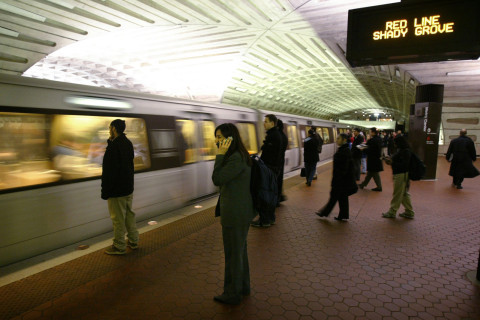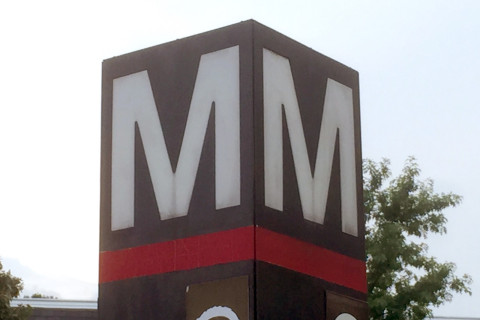Falsified station inspection reports, wasted money on a self-cleaning toilet and hidden silt pumps, and millions in contracts that appear to have been wrongly steered to specific companies are among recent findings from investigations by Metro’s Office of Inspector General.
Inspection reports
After a steel bracket and crumbling concrete fell toward riders at the Rhode Island Avenue-Brentwood station nearly three years ago, a recent follow-up investigation has concluded a series of inspection reports that should have identified the problems in advance were faked.
Though a previously public audit found many reports had identical language year after year, the new investigation completed earlier this year goes further than suggesting language simply accidentally carried over from one report to another.
“The investigation confirmed that structural evaluation technicians provided false information in the [Rhode Island Avenue] inspection reports from August of 2013 through May of 2016,” said a summary of the investigation provided by the inspector general’s office.

Though the investigation was only focused on the structural inspections at Rhode Island Avenue, the summary also describes additional evidence, suggesting “the behavior was not confined to” that station, and inspection reports could also have included false information about other stops.
It is not clear whether Metro management agreed with that conclusion, or precisely what additional actions were promised to address the issues.
The concerns are similar to those raised about track inspections following a train derailment about a month before the concrete and steel fell at Rhode Island Avenue. In that case, Metro quickly disciplined nearly half of its track inspection department, only for arbitrators to conclude last year that the inspectors were simply “scapegoated” for Metro’s widespread failings to properly adhere to standards.
Golden toilet?
Metro has likely spent more than half a million dollars on a self-cleaning toilet that has not worked for years, an investigation found. The self-cleaning toilet is at the Huntington Metro station.
Investigators found documentation of $416,789.32 in maintenance costs between 2003 and 2017, but that did not include all invoices, or any spending from 2007, 2012, 2013 or 2014.
“Based on spending from the previous years, it is probable that WMATA spent over $500,000 on the self-cleaning toilet that has been out-of-service since the fall of 2017,” an investigation summary said.
The bathroom was installed in 2003 after Metro had restricted rider use of station bathrooms.
“Given that the circumstances that prompted this initiative no longer exist — i.e. station managers can now grant access to existing restrooms — the Huntington facility was decommissioned and removed earlier this year,” Metro spokesman Ian Jannetta said in an email Friday evening.
Huntington station is currently closed due to the summerlong shutdown of the Blue and Yellow lines south of Reagan National.
Pumps hidden
When a special pump meant to pull silt from drainage pumping stations did not immediately work, it ended up hidden underground. A second pump was similarly squirreled away, never even unwrapped.
The $35,755 pumps were meant to be a pilot project that would eliminate the need to hire contractors to clear silt from pumping stations. Metro staff did not troubleshoot the pump, call the manufacturer, look at owner’s manuals, or repair any issues, the investigation found.
“Both pumps have remained in storage for the past four years, one still in its original packaging,” an investigation summary said.
The investigation recommended either using the pumps, or selling them as surplus.
Read more
- Some changes to expect when Metro’s summer shutdown in Va. finally ends
- Claims of discrimination probed in Metro internal oversight group
- Why Metro is trying to hack into its own rail cars
- Inspectors faulted for falling debris at Red Line station
- Metro inspector general’s audits include cyberattacks, sexual harassment investigations
Contracting issues
An investigation raised questions about a $44 million Metro contract for private staffing in the agency’s quality assurance division.
After a complaint about a “close relationship” between a key Metro employee and high-level official with the company that won the contract, the inspector general’s office found internal Metro documents were leaked during the process.
A Metro employee in the Quality Assurance, Internal Compliance & Oversight office sent sensitive Metro documents to his own Gmail account.
“The employee then used this personal email account to communicate with the vendor during the solicitation process,” an investigation summary said. “The employee provided sensitive and confidential information to this vendor, including the independent pricing schedule, prior to the final bid offer from the vendor.”
There was also evidence of similar communication with a subcontractor, including discussion of a future job offer.
The investigation has not yet concluded.
Other contracting-related investigations found a senior bus manager helped on a contract that went to a spouse’s firm, and that Metro had to negotiate a refund after overpaying $286,000 for credit card processing fees.
Future focus on hacking worries
Cybersecurity concerns are a key focus moving forward for Inspector General Geoff Cherrington’s office.
The concerns include Metro’s next generation rail cars, out-of-date computer operating systems, security of key aging computer systems Metro relies on to operate the rail system, Metro’s plans to respond to any hacking, and Metro’s work to keep up with computer system patches.
“Patch management is a critical control to prevent breaches,” a description of that upcoming audit said.
“WMATA has over 350 systems that need to be constantly patched for at-risk software. A patch management deficiency led to a May 2019 ransomware attack in Baltimore, Maryland, which crippled the cities [sic] government computers and cost over $18 million to recover,” the audit plan for the coming year said.
Other planned audits include contract award process, federal reimbursement, construction change order process, pension plan oversight and risk-reward strategies, health and welfare fund management, warranty management and surplus property management.







